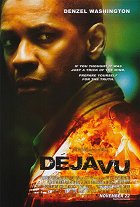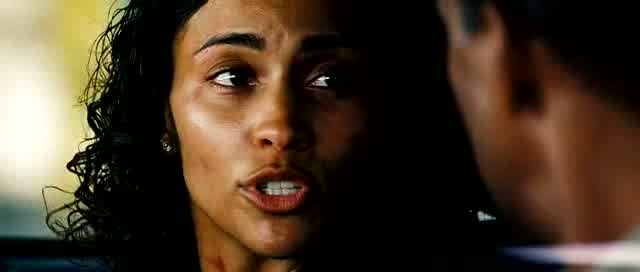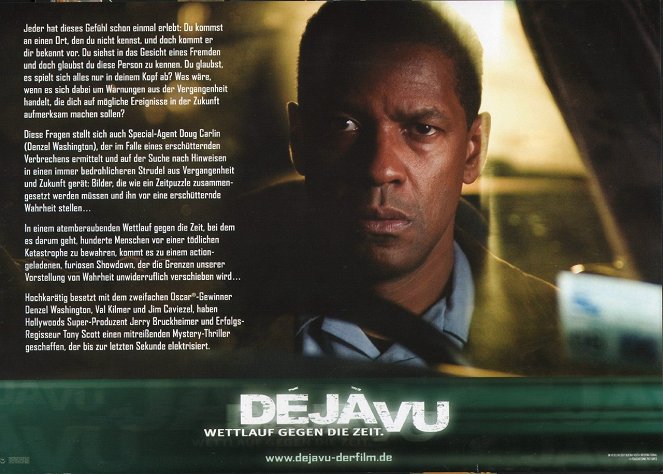Directed by:
Tony ScottCinematography:
Paul CameronComposer:
Harry Gregson-WilliamsCast:
Denzel Washington, Paula Patton, Val Kilmer, James Caviezel, Adam Goldberg, Elden Henson, Erika Alexander, Bruce Greenwood, Rich Hutchman, Matt Craven (more)VOD (1)
Plots(1)
Called in to recover evidence in the aftermath of a horrific explosion on a New Orleans ferry, Federal agent Doug Carlin (Denzel Washington) gets pulled away from the scene and taken to a top-secret government lab that uses a time-shifting surveillance device to help prevent crime. (Buena Vista Pictures US)
Videos (3)
Reviews (13)
Sure, Scott is able to make a modern sexy thriller and the camera and the directing roll this movie pretty much into the finale. Despite the fact that the theme includes a rather interesting idea of parallel worlds, its realization is very inconspicuous and predictable. More or less up to the point where the characters look through the time of the device and watch its shadows in the present, Deja Vu is a very energetic and electrifying thriller with an element of sci-fi, but the final leap through time is too cheap for me and much like a B-movie. It is useless to look for the type ethical depth that Minority Report offers, because there is no such thing in this film. It's simply dynamic action with a refreshing sci-fi motif, which hardly turns Deja Vu into anything more than just film that is better than average for its genre. That’s too bad.
()
Despite the unpleasantly fairy-tale ending, the pros prevail. The ultra-sympathetic Denzel Washington, who thinks like all the CSI members put together, the delicious James Caviezel, the likeable and funny scientists... And above all, the unmistakable bombastic direction of Tony Scott. The scene in which a man driving in a car watches a car driving on the same road that he drove on four days earlier is top-notch. Not to mention the introduction. I'm rounding up three and a half for all the entertainment.
()
An incredibly gripping masterpiece in a stylish sci-fi guise that is not marred by the understandably convoluted plot involving time travel. Tony Scott has cut down with the epileptic editing, tamed the frantic camera, and now there is something to watch again. After the visually stunning but narratively unexciting Domino, the technical genius brings us a thrilling story that speaks much more to a wider audience. Even though it’s less action-packed, it’s far more thrilling and dynamic, and above all, there are a lot more emotions, like, simple looks into the eyes. There are a few flaws and the aforementioned narrative tricks and crutches, but they couldn't be avoided. Also, the motive of the killer is somehow bland and unsatisfying. But that does not change the fact that Scott is currently an absolute number one in terms of audiovisuals, and with a skillful screenwriter, it usually results in an interesting cinematic addition.
()
Tony Scott abandoned his epileptic camera manias that bogged down the otherwise impeccable Domino and took on a script that may look original, but some of us have had the privilege before, including bending paper to explain a space-time jump (remember Event Horizon?). Some may legitimately find the whole plot terribly wacky, others may not like the incongruous combination of crime and sci-fi, but in any case Scott has made an easily digestible flick that is nice to watch, good for eating popcorn and out of your head before you can say "deja-vu". And it's a pity that, given the development of the plot, I had already figured out the only possible resolution half an hour before the end.
()
What is interesting about Déjà Vu is primarily how its screenplay provides the ideal framework for director Tony Scott’s stylistic development. After the extravagant Domino, in which the unreliable narrator gave space to spectacular formal flamboyance, Scott’s upcoming project gives the impression of being a sort of calming. However, by combining various cameras, materials, shooting speeds and post-production processes, the director found an ideal application for playing with the impression of the moment in Déjà Vu’s narrative, which in the essential middle part works with the possibility of looking into time running in the past while changing points of view. In its peak scenes, the film brings a wildly fragmented view of two different time planes running concurrently, but thanks to the visual stylisation, the viewer never gets lost even for a moment. Domino and Déjà Vu together represent the two highlights of Scott’s late-period filmography, where in the respective screenplays he had the ideal framework for his formal experiments – in one case, unbridled wildness in the interest of increasing the expressiveness and delirium of the narrative and, in the other case, the paradoxical use of those elements for maximum clarity and a credible display of the fantastical aspects of intersecting time planes.
()



Ads